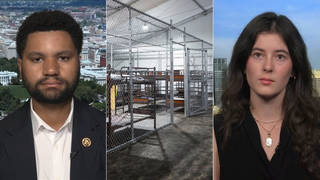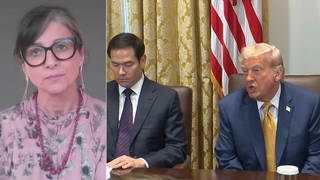
Guests
- Bara VaidaReporter covering the lobbying industry for National Journal. Her article “Former Lobbyists Join Obama” appears in this week’s issue.
Despite President Obama’s pledge to restrict former lobbyists in the White House, several are set to play key roles in his administration. The National Journal is reporting fourteen of the 112 White House staffers that Obama has named had been registered as lobbyists at some point since 2005. [includes rush transcript]
Transcript
AMY GOODMAN:
In one of his first acts as president last week, Barack Obama signed an executive order setting new rules on the role former lobbyists can play in his administration.
PRESIDENT BARACK OBAMA: As of today, lobbyists will be subject to stricter limits than under any other administration in history. If you are a lobbyist entering my administration, you will not be able to work on matters you lobbied on or in the agencies you lobbied during the previous two years. When you leave government, you will not be able to lobby my administration for as long as I am president.
AMY GOODMAN:
Despite President Obama’s pledge, several former lobbyists are set to play key roles in the new administration. Obama has nominated Raytheon’s former top lobbyist, William Lynn, to serve as Deputy Secretary of Defense. Lynn was a registered lobbyist for the defense contractor until July. Several watchdog groups, including Public Citizen and Project on Government and Oversight, have urged the Senate Committee on Armed Services to reject Lynn’s nomination because of his ties to Raytheon.
President Obama has granted a waiver to Lynn, as well as to William Corr, who has been nominated to be Deputy Secretary of the Department of Health and Human Services. Until recently, Corr was a registered lobbyist for the Campaign for Tobacco-Free Kids.
At the Treasury Department, Secretary Timothy Geithner has hired former Goldman Sachs lobbyist Mark Patterson to be his chief of staff. Patterson was a registered lobbyist until April.
The National Journal is reporting fourteen of the 112 White House staffers that Obama has named had been registered as lobbyists at some point since 2005. The list includes Obama’s senior adviser David Axelrod and Homeland Security adviser John Brennan.
We’re joined now in Washington by Bara Vaida. She is a reporter covering the lobbying industry for National Journal. Her article, “Former Lobbyists Join Obama,” appears in this week’s issue.
Lay it out for us, Bara Vaida.
BARA VAIDA:
Hi, Amy. Thanks for having me.
As Obama said, these are the most sweeping restrictions on lobbying behavior that’s ever been implemented by a president, so it’s important to remember that. I think what this shows is that there are — the lobbying industry is just a very big part of the culture of Washington and that there are a lot of people who have worked on policy that end up lobbying from time to time. And there’s such a mix between lobbying and policy that it shows how difficult it is to draw a very bright line between lobbying and policy. Lobbyists, you have to remember, do have a lot of expertise. They have a lot of information. They do play an important role in how policy is developed. So that’s, you know, an important sort of thing to remember when we talk about lobbying.
Obama did campaign on a pledge that he would limit the role of lobbyists in his White House. And as I noted, there are fourteen — or thirteen people, actually, who have had lobbying in their background who are now White House staff, and there’s probably more at this point. But there’s hundreds of positions already that he has named. So he is — he can say that he’s limited so far the role of lobbyists. But it’s important to pay attention to how many of these folks have had lobbying in their background and keep track of it to make sure he keeps with his pledge, you know, not to have lobbyists dominating his White House, as opposed to what we saw with the previous administration.
AMY GOODMAN:
What about Raytheon’s former top lobbyist, William Lynn, serving as Deputy Secretary of Defense?
BARA VAIDA:
Yes, I mean, that has certainly caused a lot of heartburn in the watchdog community. They’re very concerned about that. They don’t see how it’s any way possible that Mr. Lynn can do his job without doing something that’s going to have some kind of impact on the bottom line at Raytheon. And that’s what they’re greatly concerned about.
And that was what happened in the Bush administration. You have to remember, a lot of these rules that Obama has implemented are a reaction to what happened during the Bush years. What we saw happen in the Interior Department, Steven Griles got embroiled in something with a former lobbyist named Jack Abramoff, who’s now in jail, and that he had gotten people in the Interior Department to, you know, trade on favors for him, for his clients. And that’s what this is aimed at.
Mr. Lynn has sent a letter, apparently, to the Hill this week, trying to lay out that whatever he does that may have some effect on Raytheon, he will run it by the general counsel’s office before he does anything. And McCain and some — I think Senator Grassley, as well, have both said, “You know, that’s just too vague. We want somebody more specific.”
AMY GOODMAN:
White House Press Secretary Robert Gibbs was questioned Wednesday about the role lobbyists will have in the new administration.
REPORTER: Is the President bothered at all that Secretary Geithner has picked as his chief of staff a former lobbyist for Goldman Sachs, who has obviously — that company has benefited from government bailouts. Doesn’t that punch a hole in what the President signed just last week in terms of preventing lobbyists like that from serving in his administration?
ROBERT GIBBS: No, the President — well, again, let’s step back and talk about the broader issue of ethics and transparency in this administration. As I said from this podium, and as you all read in papers throughout the country, that the ethics and transparency executive orders that the President signed the first day institute a policy that covers this administration, unlike any policy we’ve seen in any previous administration in the history of our country.
REPORTER: But if it’s a strong — even if it’s a strong policy, does it mean anything if people are getting waivers to go around it?
ROBERT GIBBS: Those very same people that labeled that policy the strongest of any administration in history also said they thought it made sense for a limited number of waivers to ensure that people can continue to serve the public.
AMY GOODMAN:
And that was Robert Gibbs, the new press secretary. Bara Vaida, what about Treasury Department Secretary Tim Geithner hiring former Goldman Sachs lobbyist Mark Patterson to be his chief of staff? Patterson, a registered lobbyist until April.
BARA VAIDA:
Again, I mean, it’s a good question. I mean, Patterson was lobbying up until about March of 2008, and there is definitely a question: how can he do his job without doing something that may have an impact on Goldman Sachs? It’s almost impossible. So I think it’s totally fair to raise these questions.
And I think the administration is going to keep getting hit with these questions until they explain how they’re deciding how they’re implementing these waivers. They haven’t explained that, what their standard is. I have asked them that. They don’t want to answer it. You heard the response. That’s the response we tend to get, which is, “We’ve said we’ll do a few waivers in the cases where we think there’s unique experience of this person and that a waiver should be granted.” I guess, you know, people will be watching this very carefully, and people will have to decide: are the exceptions OK or not? I think the administration really needs to explain what standard they’re using, and that is not clear.
AMY GOODMAN:
Bara Vaida, I want to thank you very much for being with us, reporter covering the lobbying industry for National Journal.













Media Options